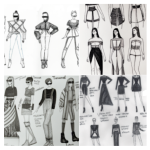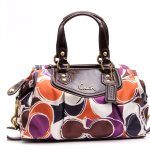The landscape of fashion has evolved significantly over the past two decades, accompanied by a surge in clothing consumption. Amidst this trend, the rise of fast fashion brands has reshaped the industry, offering affordability and frequent style updates. However, the allure of quick and cheap fashion comes at a cost. This article delves into the realm of fast fashion, shedding light on brands to approach with caution due to their ecological and ethical implications.
The Fast Fashion Conundrum
The staggering statistics reveal a compelling narrative: clothing consumption has soared by a staggering 400% compared to two decades ago, accompanied by an average annual textile waste generation of 82 pounds per American. The rapid growth of the fast fashion sector underpins this shift, fostering a culture of overconsumption. While acknowledging the economic constraints faced by some consumers, the focus here is on those who perpetuate the cycle of excessive purchasing. The essence lies in reevaluating our buying habits and opting for conscious choices.
Understanding Fast Fashion
Fast fashion encompasses brands that churn out large volumes of clothing throughout the year, capitalizing on affordability and fleeting trends. The accessibility to an ever-changing wardrobe is appealing, but the repercussions are far-reaching. The cycle of mass-produced, low-quality garments fuels textile waste, environmental degradation, and ethical dilemmas such as labor rights violations.
Identifying the Red Flags
Spotting fast fashion brands requires a discerning eye. Most often, these brands flood the market with new collections weekly, prompting impulse purchases. Their opacity regarding supply chains and production methods raises concerns. A lack of transparency shrouds their environmental and social impact, as they refrain from revealing efforts to mitigate harm. Many engage in greenwashing, employing misleading tactics to project an image of ethical and sustainable practices.

Fast Fashion Brands to Approach with Caution
- Shein: Rapid Growth, Environmental Neglect
Shein, a Chinese brand, has gained immense popularity through its expansive product offerings and social media presence. Its rapid release of 500 new products daily aligns with the throw-away culture perpetuated by fast fashion. Unfortunately, Shein lacks transparency concerning its environmental practices and supply chain. Allegations of inadequate wages and controversies around offensive products further taint its image.

- Mango: A Path to Progress, Yet Unfulfilled
Spanish retailer Mango has taken strides towards sustainability, incorporating organic cotton and recycled polyester into its collections. Despite these efforts, the brand’s failure to commit to greenhouse gas emission reduction targets and insufficient wages for workers underscore areas for improvement.
- H&M: A Dual Identity
H&M, a prominent Swedish brand, grapples with a paradox – its ambition to be sustainable juxtaposed with questionable ethical practices. While commendable efforts to eliminate harmful chemicals exist, reports of inadequate wages, abusive conditions, and lack of intervention persist. H&M’s stance on ethics and sustainability seems to be at odds, warranting scrutiny.
- Boohoo: Promises Unfulfilled
British retailer Boohoo’s rapid growth has been marred by accusations of exploitation and unsustainable practices. Despite pledges to enhance transparency and support local communities, it has fallen short. Reports of underpaid workers and inadequate safety measures tarnish its reputation.

- Forever 21: Cheap Costs, High Consequences
Forever 21, an American brand known for affordable fashion, grapples with labor controversies and a lack of transparency. Instances of low wages and failure to sign agreements for worker safety underscore its ethical shortcomings.
- Urban Outfitters, Anthropologie & Free People: The Need for Clarity
Urban Outfitters, a sizable American retailer, remains enigmatic regarding its sustainability initiatives. Absence of transparency in supply chains, fair wages, and ethical practices raise questions about its commitment to a responsible fashion industry.
Shaping a Responsible Fashion Future
In a world inundated with fashion choices, responsible consumer decisions are paramount. By abstaining from fast fashion brands that perpetuate environmental harm and ethical dilemmas, we exercise our purchasing power to drive change. Prioritizing sustainable alternatives empowers a future where style and ethics coexist harmoniously.




